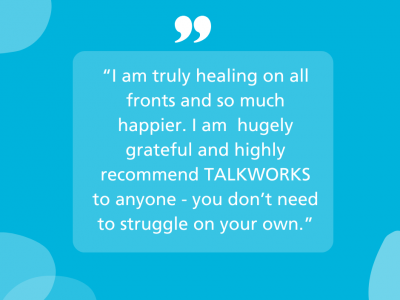- Home
- Anxiety
- Depression
- Emotional Eating
- Living With a Long Term Health Condition
- Loneliness
- Menopause
- Mindfulness
- OCD
- Panic Attacks
- Phobias
- Pregnancy & Parenthood
- Prolonged Grief (Grieving)
- PTSD
- Sleep Difficulties
- Stress
- Veterans mental health
- Needs We Can and Cannot Meet
- Cognitive Behavioural Therapy (CBT)
- Eye Movement Desensitisation & Reprocessing (EMDR)
- Employment Support
- Counselling for Depression
- Online Self-help
- Mindfulness
- Wellbeing Workshops
- Join the team
- Become a volunteer
- What to expect at your first appointment
- Testimonials
- Learn about mental health
- FAQs
- Mental Health Resources
- Blog
- Video Appointments
- Your feedback
- Making contact if you are deaf
- I need help now
Access support from TALKWORKS
Self-refer to TALKWORKSAccess support from TALKWORKS
Self-referHow is the cost of living crisis impacting on our mental health?
When we look at our mental health, we consider our psychological and social wellbeing, and how we are feeling as a result of this. Our mental health affects how we think, feel and act; it determines how we relate to each other and manage situations. When small stresses in our day-to-day life, start to escalate as a result of situations that are outside our control (like the cost of living crisis), it could be time to seek support. In this blog we will review what the cost of living crisis is and how we can look after ourselves when times are tough. We’ll also look at how a service like TALKWORKS can help if you are struggling with your mental health or wellbeing.
What is the cost of living crisis?
The ‘cost of living crisis’ refers to the increasing prices of day-to-day living, including bills, rent, food and drink. Over the past year, we have seen a rise in the cost of living; one which has not been seen in this country to such an extent in 40 years. A rise in the cost of living has had an impact on millions of people across the country. People are having to think about, and make decisions about, what they never had to consider in the past. According to Which’s monthly Consumer Insights Tracker, 3 in 10 single parent households (who answered the survey) admitted that they had skipped meals due to the rise in food prices.
The uncertainty that comes with the rising cost of living can also cause our stress and anxiety levels to increase. Not knowing how much the cost of living is going to continue to rise, and trying to choose between ‘heating and eating’ can lead to increased worry and prolonged low mood.
How can we support ourselves?
Looking at how we can cut down on spending can help to reduce some of the worry that we may experience in this uncertain time.
By taking control of your finances, you can work out budgets and get a true picture of where you are financially and what support you are entitled to. Tips from Martin Lewis’ ‘Cost of Living Survival Kit’ can further help with this as he offers recommendations on how to reduce spending and save money.
Alongside saving money and supporting yourself financially, there are also ways that you can look after your health and wellbeing. Learning to manage worry will help to reduce stress and anxiety to stop you feeling overwhelmed. It can help to have a pen and paper next to you when you sleep, so that if you find that your worries are starting to impact you at night, you can write the worry down and get it off your chest. Writing a diary or keeping a journal is another healthy way to relieve some worry so that you can understand more how you are feeling and what steps you can take to feel better.
If you are finding that you are struggling emotionally as a result of the cost of living crisis, it’s important to make sure that you still look after yourself physically. Exercising regularly and maintaining a good diet can help to improve your mood and enable you to relax more easily. If you're feeling persistently low, down or hopeless, you may be experiencing symptoms of depression. Eating healthily can be difficult for some of us on a budget, but charities like the British Heart Foundation has provided tips for how to do this in an affordable way.
Speaking to a friend or family member can also help you take some of the weight off your shoulders. If you confide in someone you trust, you may get a different perspective on your problems and be able to manage the difficulties in a way you hadn’t realised. It can also help if someone else understands more about your situation so that they can support you, and in turn open up to you about their circumstances.
What if i want to speak to someone externally?
If you would prefer to talk to someone confidentially, who isn't a friend or family member, you can reach out to a local NHS service like TALKWORKS. Here at TALKWORKS, we have trained Clinicians who are here to listen to you and understand more about the difficulties you are going through. Our therapists will then be able to work with you so that you can learn useful coping mechanisms to feel better and more like yourself again. These can include learning how to manage worry, reduce stress and improve overall wellbeing. You can talk to TALKWORKS by self referring to our service without needing to see a GP first. Simply call us on 0300 555 3344 (our phone lines are open from Monday to Friday from 9-5), or self-refer via our website by completing an online self-referral form.
Related Posts

Sharon shares her story
Posted by Admin on 27 June, 2025

TALKWORKS staff member set to take part in the Baton of Hope tour
Posted by Admin on 13 June, 2025

